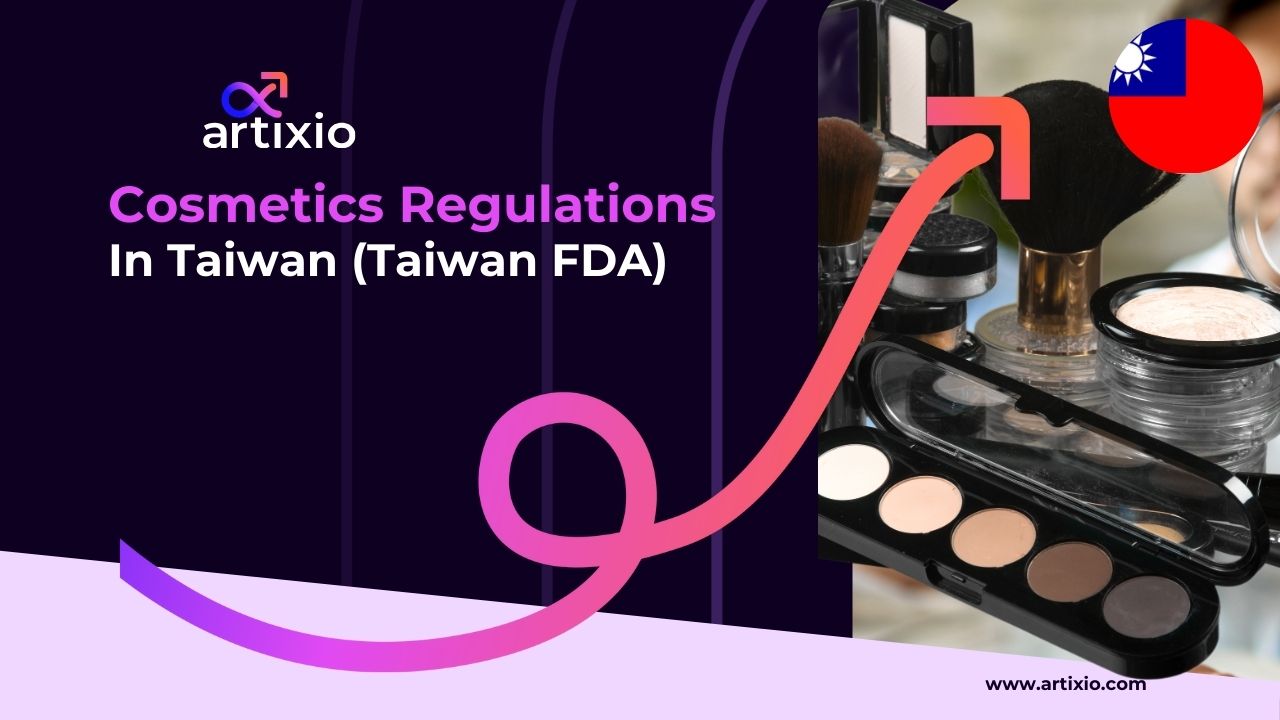The cosmetics industry is a vital sector in Taiwan, with an increasing emphasis on safety and quality. The Taiwan Food and Drug Administration (TFDA) oversees the regulation of cosmetics to ensure that products are safe for consumer use. This blog provides an in-depth look at the regulatory framework governing cosmetics in Taiwan, the definitions involved, the registration process, and compliance requirements.
Which Products are considered as Cosmetics in Taiwan ?
In Taiwan, “cosmetics” refer to products applied externally to the human body, including the skin, hair, teeth, and mucous membranes. These products aim to moisturize, cleanse, enhance appearance, or alter body odors. If there is any uncertainty about whether a product qualifies as a cosmetic, the product owner can submit an application to the TFDA for regulatory clarification. The manufacturer or the important seeking the regulatory classification by TFDA shall pay the applicable fees.
Regulatory Authority and Regulatory Framework for Cosmetics in Taiwan
The regulatory framework for cosmetics in Taiwan is multi-level, with various legislative and administrative components. At the core is the Cosmetic Hygiene and Safety Act, which establishes the fundamental principles governing the industry. This act is supported by Enforcement Rules and a series of Orders and Administrative guidelines that provide detailed regulations and compliance requirements.
Taiwan FDA (TFDA) Regulation of Cosmetics in Taiwan
The TFDA employs a comprehensive life cycle approach to cosmetics regulation, encompassing both pre-market and post-market management.
Pre-market management: All cosmetics are to be notified to the Taiwan Food and Drug Administration (TFDA).
Post-market surveillance: This aspect includes cosmetic quality surveillance, cosmetic safety surveillance, and the establishment of a Product Information File (PIF). It also incorporates factory inspections to ensure compliance with regulatory standards.
Production source control is a critical component, involving the Establishment Standards for Cosmetics Manufactory and the promotion of Cosmetics Good Manufacturing Practice (GMP) regulations, which has come into effect on July 1, 2024, with varying requirements based on product types. Key elements of production oversight include factory registration and adherence to GMP standards to maintain high safety and quality levels for cosmetic products.
Taiwan FDA (TFDA) Categorization of Cosmetics in Taiwan
The TFDA categorizes cosmetics into two groups:
- General Cosmetics: Products that do not have specific therapeutic claims.
- Specific Purpose Cosmetics: These contain specific ingredients for functions such as sunscreen, hair dyeing, or tooth whitening etc .
Taiwan FDA (TFDA) Regulatory Requirements for the Cosmetics in Taiwan
The Cosmetic Product Notification requirement was established on July 1, 2021, and has been implemented in phases. Since then, general cosmetics have been subject to this notification requirement. Specific-purpose cosmetics will need to submit their product notifications starting July 1, 2024. Manufacturers and importers of handmade soaps are exempt from these registration requirements. Additionally, the following requirements must be met:
- Ingredient Compliance: Ensure all ingredients comply with Taiwan’s regulations regarding cosmetic ingredients for safety and stability.
- Labeling: Provide appropriate labeling as per regulatory standards.
- Product Information File (PIF): Establish a Product Information File according to the announced schedule.
- Good Manufacturing Practice (GMP): Adhere to Cosmetics Good Manufacturing Practice regulations at the manufacturing facilities.
The previous registration system is no longer active from 1st July 2024; only the notification system is currently in effect.
TFDA Good Manufacturing Practice (GMP) Requirements for Cosmetics in Taiwan
The Manufacturers of cosmetics must establish proper facilities and maintain a high standard of hygiene, training, and quality control. Inspections will be conducted by the TFDA to ensure compliance. From July 1, 2024, all cosmetics manufacturers, both domestic and foreign, must comply with Cosmetics Good Manufacturing Practice (GMP). The regulations are based on ISO 22716 guidelines and will vary depending on the type of product. The categories and enforcement dates are:
Considerations When Choosing Ingredients for Cosmetics Marketed in Taiwan
Cosmetics must not contain mercury, lead, or any other banned ingredients, although trace amounts that pose no hazard may be present. Additionally, cosmetic businesses are prohibited from conducting animal testing unless the ingredient is widely used and irreplaceable, or if testing is necessary to demonstrate potential harm to human health.
When formulating cosmetics for the Taiwan market, manufacturers and importers must adhere to the Taiwan FDA (TFDA) regulations regarding ingredient selection. Key considerations include:
Negative List: Certain ingredients are completely banned from use in cosmetics. Products intended for the Taiwanese market must not include any of these prohibited substances.
Restricted Ingredients: Some ingredients are subject to specific restrictions. The TFDA provides detailed lists that outline allowable ingredients, including:
- List of Specific Purpose Ingredients: Ingredients designated for specific functions in cosmetics.
- List of Colorants: Approved color additives for use in cosmetic formulations.
- List of Preservatives: Permissible preservatives to ensure product stability and safety.
- List of Ingredients Restricted: Components that have limitations on their use.
- List of Antibacterial Ingredients: Approved antibacterial agents that can be used in cosmetics.
Taiwan FDA(TFDA) Data Requirements for Cosmetic Product Notification in Taiwan
The Taiwan FDA (TFDA) has established a notification platform for the registration of cosmetic products, accessible at TFDA Notification Platform. According to Article 4 of the Regulations Governing Notification of Cosmetic Products, the following data must be submitted for cosmetic product notification:
- Notification Number: Unique identifier for the product.
- Product Names: Chinese and English names, although English names are not required for domestic products.
- Category and Usage: Clear classification of the product and its intended use.
- Type of Products: Including model number and color code for variations.
- Dosage: Information on the recommended amount to be used.
- Precautions: Safety instructions and warnings associated with the product.
- Manufacturer or Importer Information: Names, addresses, and telephone numbers.
- Manufacturing Premises: Names, addresses, and nationalities of the facilities, along with compliance with Good Manufacturing Practice (GMP) standards.
- Full Component List: Detailed breakdown of product ingredients, including weight or percentage, especially if usage limitations are set by authorities.
- Additional Descriptions: Any other relevant information that may be required.
All data must be provided in Chinese, English, numbers, or internationally recognized symbols.
TFDA Cosmetic Product Information File (PIF)
The Product Information File (PIF) is a collection of documents that provide essential data regarding the quality, safety, and functions of cosmetics. Manufacturers and importers are required to establish a PIF for different categories of cosmetics by specific enforcement dates.
Taiwan FDA (TFDA) Requirements for Safety Assessor for Product Information File
The qualifications for the safety assessor (the signatory for the safety report) are outlined in Articles 4, 5, and 6 of the Regulations for Cosmetic Product Information File Management:
- An individual must have graduated from a department of medicine, pharmacy, toxicology, cosmetics, or other related fields from either a domestic or a foreign university recognized under the Regulations Governing the Assessment and Recognition of Foreign Academic Records.
- They should have completed cosmetic safety evaluation training courses offered by a domestic or foreign university or by a central competent authority.
- The signatory for the safety report of the product information file is required to complete at least eight hours of relevant coursework annually.
- The countries or regions that have signed cooperation agreements with the Republic of China (Taiwan) regarding the signatory for the safety report of the product information file.
An employee or external consultant who meets these qualifications may act as the signatory for the safety report.
Establishing a Cosmetic Product Information File is essential for compliance with TFDA regulations in Taiwan. By understanding the requirements and preparing the necessary documentation, cosmetic manufacturers and importers can navigate the regulatory landscape effectively. Staying informed about deadlines and maintaining thorough records will help ensure a successful entry into the Taiwanese market.
Taiwan FDA (TFDA) Labeling Requirements for Cosmetics in Taiwan
The labeling of cosmetics in Taiwan is governed by strict guidelines to ensure transparency and consumer safety. The outer packaging or containers must clearly display the following information:
- Product Name: Clearly state the name of the cosmetic.
- Function: Indicate the intended use or benefits of the product.
- Usage and Storage Instructions: Provide detailed instructions on how to use and store the product safely.
- Net Weight, Volume, or Amount: Specify the quantity of the product contained.
- Full Ingredient Names: List all ingredients in full. For specific-purpose cosmetics, the content of specific-purpose ingredients must be labeled separately.
- Precautions for Use: Highlight any necessary safety warnings or precautions.
- Manufacturer or Importer Details: Include the name, address, and telephone number of the manufacturer or importer, along with the country of origin for imported products.
- Manufacturing Date and Shelf Life: Clearly state the manufacturing date and either the shelf life or expiration date.
- Lot Number: Provide a lot number for traceability.
- Other Required Information: Include any additional information mandated by the central competent authority.
All labeling information must be provided in Chinese or universally recognized symbols, with full ingredient names also permissible in English. If the packaging size is too small to accommodate all required information, it may be provided in a leaflet or through other means.
Additionally, the contents of the labeling and advertisements must not be misleading or exaggerated. Claims of medical efficacy, such as weight loss or anti-inflammatory properties, are prohibited. Sellers must not alter or modify any labeling or packaging once approved.
All mass media outlets involved in advertising must maintain records of the principal details for six months and must comply with requests from authorities for this information. These comprehensive labeling regulations aim to protect consumers and ensure that they have access to accurate product information.
Conclusion
The regulatory landscape for cosmetics in Taiwan is comprehensive and designed to protect consumer safety. With a strong focus on pre-market notifications, GMP compliance, and strict ingredient regulations, both consumers and manufacturers are assured of product quality and safety.. Whether you’re developing a new product or simply choosing cosmetics, being informed is key to making safe and compliant choices.
If you have any questions or need assistance regarding cosmetic regulations in Taiwan, feel free to reach out to us at Artixio. We’re here to help! Contact us at info@artixio.com for support and guidance tailored to your needs.
References:
https://www.fda.gov.tw/eng/Site.aspx?sid=10169




